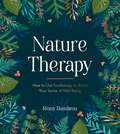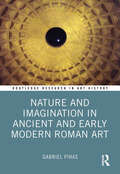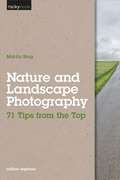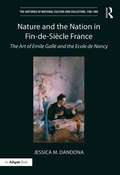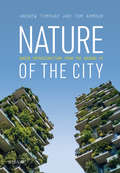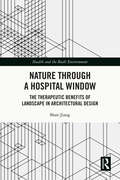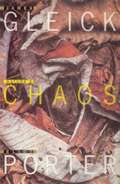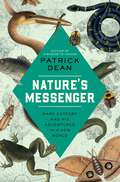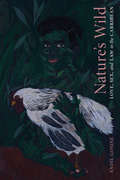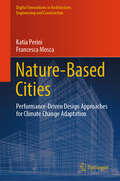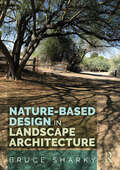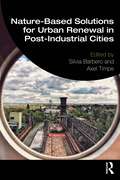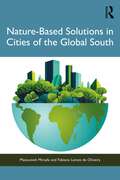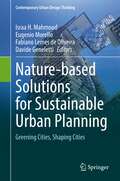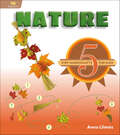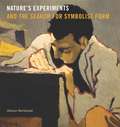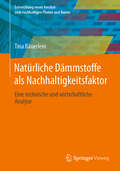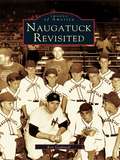- Table View
- List View
Nature Therapy: How to Use Ecotherapy to Boost Your Sense of Well-Being
by Rémy DambronNature therapy is the practice of reconnecting with the natural world to refresh your physical and mental well-being. Including tips to help you discover your connection with the outdoors, activity inspiration and a holistic approach to wellness, this book is the ultimate guide to unlocking the transformative power of nature.
Nature Therapy: How to Use Ecotherapy to Boost Your Sense of Well-Being
by Rémy DambronNature therapy is the practice of reconnecting with the natural world to refresh your physical and mental well-being. Including tips to help you discover your connection with the outdoors, activity inspiration and a holistic approach to wellness, this book is the ultimate guide to unlocking the transformative power of nature.
Nature and Imagination in Ancient and Early Modern Roman Art (Routledge Research in Art History)
by Gabriel PihasThis volume uses the art of Rome to help us understand the radical historical break between the fundamental ancient pre-supposition that there is a natural world or cosmos situating human life, and the equally fundamental modern emphasis on human imagination and its creative power. Rome’s unique art history reveals a different side of the battle between ancients and moderns than that usually raised as an issue in the history of science and philosophy. The book traces the idea of a cosmos in pre-modern art in Rome, from the reception of Greek art in the Roman republic to the construction of the Pantheon, to early Christian art and architecture. It then sketches the disappearance of the presupposition of a cosmos in the High Renaissance and Baroque periods, as creativity became a new ideal. Through discussions of the art and architecture that defines proto-modern Rome— from Michelangelo’s terribilita’ in the Sistine Chapel, Caravaggio’s realism, Baroque illusionism, the infinities of Borromini’s architecture, to the Grand Tour’s representations of ruins— through an interpretation of such major issues and works, this book shows how modern art liberates us while leaving us feeling estranged from our grounding in the natural world. The book will be of interest to scholars working in art history, architectural history, classics, philosophy, and early modern history and culture.
Nature and Landscape Photography
by Martin BorgWhat happens when you bring two of your passions together? Magic, of course. Photography offers a perfect outlet for creativity and emotions. Nature provides peace, serenity, and a wellspring of energy. To combine both--to photograph nature--is a unique and fulfilling experience. In this book, renowned Swedish nature photographer Martin Borg shares his experience and insight along with 71 of his beautiful images that illustrate each point. He offers helpful advice for beginning to intermediate photographers, ranging from technical tips, to aesthetics, to philosophical thoughts on the essence of being a nature photographer.
Nature and the Nation in Fin-de-Siècle France: The Art of Emile Gallé and the Ecole de Nancy (The Histories of Material Culture and Collecting, 1700-1950)
by Jessica M. DandonaBy the time of his death in 1904, critics, arts reformers, and government officials were near universal in their praise of Art Nouveau designer Emile Gallé (1846–1904), whose works they described as the essence of French design. Many even went so far as to argue that the artist’s creations could reinvigorate France’s fading arts industries and help restore its economic prosperity by defining a modern style to represent the nation. For fin-de-siècle viewers, Gallé’s works constituted powerful reflections on the idea of national belonging, modernity, and the role of the arts in political engagement. While existing scholarship has largely focused on the artist’s innovative technical processes, a close analysis of Gallé’s works brings to light the surprisingly complex ways in which his fragile creations were imbricated in the political turmoil that characterized fin-de-siècle France. Examining Gallé’s works inspired by Japanese art, his patriotically inflected designs for the Universal Exposition of 1889, his artistic manifesto in support of Dreyfus created in 1900, and finally, his late works that explore the concept of evolution, this book reveals how Gallé returns again and again to the question of national identity as the central issue in his work.
Nature by Design: The Practice of Biophilic Design
by Stephen R. KellertBiophilia is the theory that people possess an inherent affinity for nature, which developed during the long course of human evolution. In recent years, studies have revealed that this inclination continues to be a vital component to human health and wellbeing. Given the pace and scale of construction today with its adversarial, dominative relationship with nature, the integration of nature with the built environment is one of the greatest challenges of our time. In this sweeping examination, Stephen Kellert describes the basic principles, practices, and options for successfully implementing biophilic design. He shows us what is—and isn’t—good biophilic design using examples of workplaces, healthcare facilities, schools, commercial centers, religious structures, and hospitality settings. This book will to appeal to architects, designers, engineers, scholars of human evolutionary biology, and—with more than one hundred striking images of designs—anyone interested in nature‑inspired spaces.
Nature of the City: Green Infrastructure from the Ground Up
by Tom Armour Andrew TempanyThis is a practical guide to delivering green infrastructure from the ground up and bringing nature in to the built environment. Exploring the process of delivery through an array of design approaches and case studies, it demystifies the concept and provides the tools for practical implementation - highlighting the challenges and opportunities on both small and large projects.
Nature through a Hospital Window: The Therapeutic Benefits of Landscape in Architectural Design (Health and the Built Environment)
by Shan JiangAdopting an evidence-based approach, this book uses two state-of-the-art experimental studies to explore nature’s therapeutic benefits in healthcare environments, emphasizing how windows and transparent spaces can strengthen people–nature interactions. High-quality, supportive, and patient-centred healthcare environments are a key priority for healthcare designers worldwide, with ageing populations creating a demand for remodeled and updated facilities. The first study demonstrates individual psychophysiological responses, moods, and preferences in simulated hospital waiting areas with different levels of visual access to nature through windows, while the second experiment uses cutting-edge immersive virtual reality techniques to explore how gardens and nature views impact people’s spatial cognition, wayfinding behaviors, and experience when navigating hospitals. Through these studies and discussions drawing on architectural theory, the book highlights the important benefits of having access to nature from hospital interiors. This concise volume will appeal to academics and designers interested in therapeutic landscapes and healthcare architecture.
Nature's Chaos
by James Gleick Eliot PorterWith 102 spectacular full-color photos, this fascinating "field guide" explores the world's natural disorder.
Nature's Engraver: A Life of Thomas Bewick
by Jenny UglowA beautifully illustrated biography of Thomas Bewick (1753-1828),the man whose art helped shape the way we view the natural worldAt the end of the eighteenth century, Britain, and much of the Western world, fell in love with nature. Thomas Bewick's History of British Birds marked the moment, the first "field guide" for ordinary people, illustrated with woodcuts of astonishing accuracy and beauty. But his work was far more than a mere guide, for in the vivid vignettes scattered through the book, Bewick captured the vanishing world of rural English life. In this superb biography, Jenny Uglow tells the story of the farmer's son from Tyneside who influenced book illustration for a century to come. It is a story of violent change, radical politics, lost ways of life, and the beauty of the wild -- a journey to the beginning of our lasting obsession with the natural world.
Nature's Harmonic Unity: A Treatise On Its Relation To Proportional Form
by Samuel ColmanExplore the profound relationship between nature and art with Samuel Colman's groundbreaking work, "Nature's Harmonic Unity." This classic text delves into the mathematical principles and geometric patterns that underpin the natural world, offering a unique perspective on how these elements influence artistic composition and design.Samuel Colman, an accomplished painter and architectural designer, brings his keen eye and analytical mind to this comprehensive study. In "Nature's Harmonic Unity," he examines the ways in which natural forms—such as the spirals of shells, the branching of trees, and the symmetry of flowers—are governed by fundamental mathematical ratios and geometric shapes. Colman’s work reveals the inherent order and beauty in nature, providing a deeper understanding of the harmonious structures that artists have long sought to capture.The book is richly illustrated with diagrams, sketches, and photographic examples that vividly demonstrate the concepts discussed. Colman explores the Golden Ratio, the Fibonacci sequence, and other mathematical phenomena, showing how these principles manifest in both natural objects and human creations. His analysis extends to architecture, painting, and sculpture, illustrating how an awareness of nature's harmonic unity can enhance artistic expression and design."Nature's Harmonic Unity" is more than a technical manual; it is a philosophical exploration of the interconnectedness of all things. Colman argues that by understanding and applying these universal principles, artists and designers can create works that resonate on a deeper, more intuitive level with viewers. His insights bridge the gap between science and art, making this book an invaluable resource for artists, architects, designers, and anyone interested in the profound connections between nature and human creativity.
Nature's Messenger: Mark Catesby and His Adventures in a New World
by Patrick DeanA dynamic and fresh exploration of the naturalist Mark Catesby—who predated John James Audubon by nearly a century— and his influence on how we understand American wildlife.In 1722, Mark Catesby stepped ashore in Charles Town in the Carolina colony. Over the next four years, this young naturalist made history as he explored deep into America&’s natural wonders, collecting and drawing plants and animals which had never been seen back in the Old World. Nine years later Catesby produced his magnificent and groundbreaking book, The Natural History of Carolina, the first-ever illustrated account of American flora and fauna. In Nature&’s Messenger, acclaimed writer Patrick Dean follows Catesby from his youth as a landed gentleman in rural England to his early work as a naturalist and his adventurous travels. A pioneer in many ways, Catesby&’s careful attention to the knowledge of non-Europeans in America—the enslaved Africans and Native Americans who had their own sources of food and medicine from nature—set him apart from others of his time. Nature&’s Messenger takes us from the rice plantations of the Carolina Lowcountry to the bustling coffeehouses of 18th-century England, from the sun-drenched islands of the Bahamas to the austere meeting-rooms of London&’s Royal Society, then presided over by Isaac Newton. It was a time of discovery, of intellectual ferment, and of the rise of the British Empire. And there on history&’s leading edge, recording the extraordinary and often violent mingling of cultures as well as of nature, was Mark Catesby. Intensively researched and thrillingly told, Nature&’s Messenger will thrill fans of exploration and early American history as well as appeal to birdwatchers, botanists, and anyone fascinated by the natural world.
Nature's Splendor Stained Glass Pattern Book
by M. S. HansonPerfect for a variety of skill levels, this collection boasts an impressive array of stained glass patterns. Images include a tropical sunrise, Tuscan vineyard, a graceful crane, and other animals, plus abstract designs -- 90 motifs in all, shown in black and white and in 16 pages of color plates.
Nature's Wild: Love, Sex, and Law in the Caribbean
by Andil GosineIn Nature's Wild, Andil Gosine engages with questions of humanism, queer theory, and animality to examine and revise understandings of queer desire in the Caribbean. Surveying colonial law, visual art practices, and contemporary activism, Gosine shows how the very concept of homosexuality in the Caribbean (and in the Americas more broadly) has been overdetermined by a colonially influenced human/animal divide. Gosine refutes this presupposed binary and embraces animality through a series of case studies: a homoerotic game called puhngah, the institution of gender-based dress codes in Guyana, and efforts toward the decriminalization of sodomy in Trinidad and Tobago—including the work of famed activist Colin Robinson, paintings of human animality by Guadeloupean artist Kelly Sinnapah Mary, and Gosine's own artistic practice. In so doing, he troubles the ways in which individual and collective anxieties about “wild natures” have shaped the existence of Caribbean people while calling for a reassessment of what political liberation might look like.Duke University Press Scholars of Color First Book Award recipient
Nature-Based Cities: Performance-Driven Design Approaches for Climate Change Adaptation (Digital Innovations in Architecture, Engineering and Construction)
by Katia Perini Francesca MoscaThis book introduces a groundbreaking approach to urban design, addressing site-specific challenges arising from the impacts of climate change. It provides an overview of the most relevant climate change impacts and related adaptation strategies, aligning with sustainable development goals. Nature-based solutions (NBS) are some of the most significant adaptation strategies, yet the book addresses the lack of quantitative approaches for their design. A design approach and related methodology that can be used by designers with different levels of complexity is presented, discussing its applicability and limitations according to selected key performance indicators and related thresholds. Such methodology and the related tools are applied to case studies with a focus on the performance of NBS in improving thermal comfort (microclimate regulation) and reducing flooding risks (stormwater retention). A final workflow for a coupled performance-driven design approach is presented for readers, offering a pathway to define design strategies based on site-specific key performance indicators. The target audience includes practitioners, urban designers and planners, researchers, and anyone interested in urban environment design, nature-based solutions, and computational approaches to sustainable design.
Nature-Based Design in Landscape Architecture
by Bruce SharkyNature-Based Design in Landscape Architecture showcases a range of built works designed by landscape architects from many countries of the world representing diverse environmental regions and uses. These projects demonstrate the transformative potential of a nature-based approach to landscape architecture.The nature-based design approach supports and encourages natural regeneration with a view to promoting sustainable environments, preserving natural resources, and mitigating the impacts of climate change and development. The projects selected for this book demonstrate the potential of nature-based landscape design to support healthy, natural and managed ecosystems, sequester carbon, and support the recovery of biodiversity. In addition to examples of design-led environmental interventions, Nature-Based Design in Landscape Architecture, the book, also demonstrates the potential for nature-based design to improve people’s relationship with their surroundings by encouraging them to be active participants in their communities. As such, each project featured in the book promotes a discussion around future scenarios in which landscape architects can and will be engaged, from minimizing environmental impact through sustainable design to fostering social justice through community engagement.This book will be a welcome supplement for undergraduate landscape architecture, survey or design studio courses, and may also be used at the master’s degree level either as part of a landscape architecture survey seminar or early design studio.
Nature-Based Solutions for Urban Renewal in Post-Industrial Cities
by Silvia Barbero Axel TimpeThis book, based on the experiences and insights gained during the Horizon 2020 project proGIreg, offers a detailed overview of targeted nature-based solutions and their impacts on various key sustainability areas, guiding readers through the spatial analysis, co-design, and implementation processes of cities in Europe and Asia. Chapters shed light on the challenges and opportunities encountered in each location, including Germany, Italy, Croatia, Bosnia and Herzegovina, Greece, Portugal, Romania and China. It also shares essential lessons learned and a wide range of indicators crucial for assessing the benefits of nature-based solutions on social innovation, circular economy, biodiversity, and health. Finally, the focus of this book shifts to the future of nature-based solutions as catalysts for new and green community economies as well as policies aimed at addressing climate change and urban renewal. The lessons and insights from the projects highlighted in this book will be valuable for urban planners and policymakers worldwide, as well as for a broader audience interested in nature-based solutions and urban regeneration.The Open Access version of this book, available at www.taylorfrancis.com, has been made available under a Creative Commons CC-BY 4.0 license.
Nature-Based Solutions in Cities of the Global South
by Masoumeh Mirsafa Fabiano Lemes de OliveiraThis book explores the practice of Nature-Based Solutions (NBS) in the cities of the Global South. NBS are recognized as a key strategy for achieving sustainable development, and they are being implemented in a variety of sectors such as urban planning, agriculture, forestry, and water management. They offer a wide range of benefits, but there is a gap between research and practice across cities from the Global South. This book promotes implemented urban NBS projects in the Global South to help identify region-specific challenges and opportunities, and to develop more effective and equitable solutions. The presented case studies support resilient planning in the Global South and significantly inform urban debates in the Global North. This book offers pragmatic policy and planning recommendations, providing decision-makers with clear guidance on implementing NBS in urban settings and transforming knowledge into actionable strategies for sustainable and resilient urban development.
Nature-Friendly Communities: Habitat Protection And Land Use Planning
by Cara Snyder Chris DuerksenNature-Friendly Communities presents an authoritative and readable overview of the successful approaches to protecting biodiversity and natural areas in America's growing communities. Addressing the crucial issues of sprawl, open space, and political realities, Chris Duerksen and Cara Snyder explain the most effective steps that communities can take to protect nature. The book: documents the broad range of benefits, including economic impacts, resulting from comprehensive biodiversity protection efforts; identifies and disseminates information on replicable best community practices; establishes benchmarks for evaluating community biodiversity protection programs. Nine comprehensive case studies of communities explain how nature protection programs have been implemented. From Austin and Baltimore to Tucson and Minneapolis, the authors explore how different cities and counties have taken bold steps to successfully protect natural areas. Examining program structure and administration, land acquisition strategies and sources of funding, habitat restoration programs, social impacts, education efforts, and overall results, these case studies lay out perfect examples that other communities can easily follow. Among the case study sites are Sanibel Island, Florida; Austin, Texas; Baltimore County, Maryland; Charlotte Harbor, Florida; and Teton County, Wyoming. Nature-Friendly Communities offers a useful overview of the increasing number of communities that have established successful nature protection programs and the significant benefits those programs provide. It is an important new work for public officials, community activists, and anyone concerned with understanding or implementing local or regional biodiversity protection efforts.
Nature-based Solutions for Sustainable Urban Planning: Greening Cities, Shaping Cities (Contemporary Urban Design Thinking)
by Fabiano Lemes de Oliveira Davide Geneletti Israa H. Mahmoud Eugenio MorelloUrban greening policies and measures have recently shown a high potential impact on the design and reshaping of the built environment, especially in urban regeneration processes. This book provides insights on analytical methods, planning strategies and shared governance tools for successfully integrating Nature-Based Solutions (NBS) in the urban planning practice. The selected contributions present real-life application cases, in which the mainstreaming of NBS are investigated according to two main challenges: the planning and designing of physical and spatial integration of NBS in cities on one side, and the implementation of suitable shared governance models and co-creation pathways on the other. Chapter 5 is available open access under a Creative Commons Attribution 4.0 International License via link.springer.com.
Nature: 5-Step Handicrafts for Kids (5-Step Handicrafts for Kids)
by Anna LlimósIn just five simple steps, children can make a variety of whimsical crafts such as a hanging mobile, a caterpillar, a maraca, and a sailboat out of objects found in nature. Fourteen projects make clever use of commonly available materials and simple tools, turning nuts, flowers, and clay into lasting crafts and toys. Children five years and older will develop fine motor skills, feed their creativity, and discover new uses for everyday objects. A ranking system for craft difficulty levels is included, from one star to four stars, for stress-free project selection.
Nature’s Experiments and the Search for Symbolist Form (Refiguring Modernism #21)
by Allison MoreheadThis provocative study argues that some of the most inventive artwork of the 1890s was strongly influenced by the methods of experimental science and ultimately foreshadowed twentieth-century modernist practices.Looking at avant-garde figures such as Maurice Denis, Édouard Vuillard, August Strindberg, and Edvard Munch, Allison Morehead considers the conjunction of art making and experimentalism to illuminate how artists echoed the spirit of an increasingly explorative scientific culture in their work and processes. She shows how the concept of “nature’s experiments”—the belief that the study of pathologies led to an understanding of scientific truths, above all about the human mind and body—extended from the scientific realm into the world of art, underpinned artists’ solutions to the problem of symbolist form, and provided a ready-made methodology for fin-de-siècle truth seekers. By using experimental methods to transform symbolist theories into visual form, these artists broke from naturalist modes and interrogated concepts such as deformation, automatism, the arabesque, and madness to create modern works that were radically and usefully strange.Focusing on the scientific, psychological, and experimental tactics of symbolism, Nature’s Experiments demystifies the avant-garde value of experimentation and reveals new and important insights into a foundational period for the development of European modernism.
Nature’s Experiments and the Search for Symbolist Form (Refiguring Modernism)
by Allison MoreheadThis provocative study argues that some of the most inventive artwork of the 1890s was strongly influenced by the methods of experimental science and ultimately foreshadowed twentieth-century modernist practices.Looking at avant-garde figures such as Maurice Denis, Édouard Vuillard, August Strindberg, and Edvard Munch, Allison Morehead considers the conjunction of art making and experimentalism to illuminate how artists echoed the spirit of an increasingly explorative scientific culture in their work and processes. She shows how the concept of “nature’s experiments”—the belief that the study of pathologies led to an understanding of scientific truths, above all about the human mind and body—extended from the scientific realm into the world of art, underpinned artists’ solutions to the problem of symbolist form, and provided a ready-made methodology for fin-de-siècle truth seekers. By using experimental methods to transform symbolist theories into visual form, these artists broke from naturalist modes and interrogated concepts such as deformation, automatism, the arabesque, and madness to create modern works that were radically and usefully strange.Focusing on the scientific, psychological, and experimental tactics of symbolism, Nature’s Experiments and the Search for Symbolist Form demystifies the avant-garde value of experimentation and reveals new and important insights into a foundational period for the development of European modernism.
Natürliche Dämmstoffe als Nachhaltigkeitsfaktor: Eine technische und wirtschaftliche Analyse (Entwicklung neuer Ansätze zum nachhaltigen Planen und Bauen)
by Tina BäuerleinIn diesem Buch wird ein Vergleich zwischen einem natürlichen Dämmstoff und einem synthetischen Dämmstoff durchgeführt. Es wird eine Holzfaserdämmplatte mit einer EPS-Dämmplatte unter anderem anhand des Brandverhaltens, der Wärmeleitfähigkeit und Recyclingfähigkeit sowie der Lebenszykluskosten betrachtet. Zunächst wird dafür der Anwendungsbereich von Dämmstoffen aus nachwachsenden Rohstoffen allgemein abgesteckt, der sich aufgrund von regulatorischen Bestimmungen von dem der synthetischen Dämmstoffe unterscheidet. Im Zuge einer Potentialanalyse wird von verschiedenen, auf dem Markt verfügbaren, natürlichen Dämmstoffen ein Produkt ausgewählt – eine Holzfaserdämmplatte. Die technischen und wirtschaftlichen Parameter werden bewertet, indem das Produkt hypothetisch in einem realen Bauprojekt angewendet wird. In demselben Projekt wird die Analyse mit einem synthetischen Dämmstoff – einer EPS-Dämmplatte – durchgeführt. Die beiden Varianten werden miteinander verglichen und mithilfe einer Nutzwertanalyse bewertet, worin die die zuvor betrachteten Analysekriterien gewichtet werden. Dadurch kann eine Aussage zu den Performanceunterschieden der zwei Dämmstoffplatten getroffen werden. Das Buch richtet sich an Vertreter des Fachbereichs Bauingenieurwesen, die sich mit dem Themenbereich der Dämmstoffe aus nachwachsenden Rohstoffen auseinandersetzen, sowie an interessierte Leser, die für die private oder unternehmerische Nutzung bei der Außenwanddämmung neben den konventionellen Dämmstoffen auch nachhaltige Alternativen in Betracht ziehen möchten.
Naugatuck Revisited (Images of America)
by Ron GagliardiNaugatuck Revisited is an exciting new look at this historic Connecticut community. Settled in the early 1700s, Naugatuck was incorporated in 1844 and developed through the ingenuity of entrepreneurs who exploited its rivers and railroads. This volume includes images and stories of the borough's many notable luminaries, including inventor Charles Goodyear, resident and World Series Most Valuable Player Frank "Spec" Shea of the New York Yankees, legendary Hollywood fashion designer Adrian Gilbert, and the founders of the Peter Paul candy company, makers of Almond Joy and Mounds. Robert Redford spent time here preparing for the movie The Natural, and Senator John F. Kennedy made an early morning presidential campaign stop here on his way to Waterbury.
